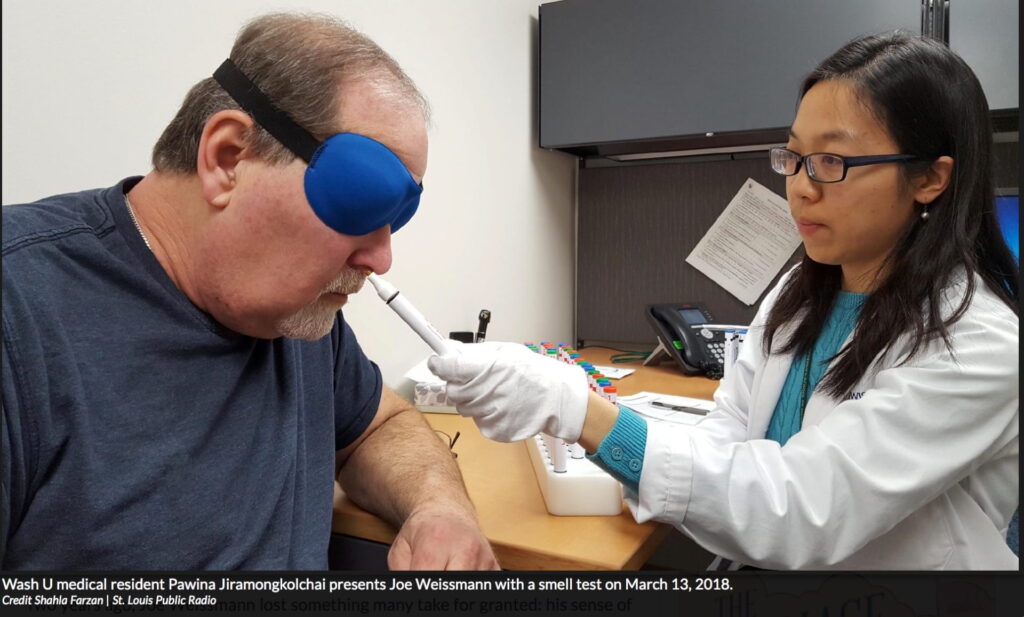The Washington University Department of Otolaryngology–Head and Neck Surgery is one of only eight otolaryngology training programs in the U.S. to offer the T32 grant for interdisciplinary research training in otolaryngology.
Supported by the National Institutes of Health, the T32 grant provides select individuals with funding to pursue two years of dedicated research training in the basic sciences, above and beyond their five years of clinical training as otolaryngologists. This competitive program allows awardees to pursue a focused area of research study, enabling them to develop the necessary skills to become successful surgeon-scientists.
In June, two of the department’s T32 residents will complete their two years dedicated to research: Pawina Jiramongkolchai, MD, and Carla Valenzuela, MD, who is also Chief Resident. We asked them to answer the question, “What did I do with my T32?”
Pawina Jiramongkolchai, MD
I am very grateful to have had the opportunity to work under the mentorship of Dr. Piccirillo in the Clinical Outcomes Lab.My primary project has been investigating post-viral olfactory dysfunction and the impact of olfactory training on smell restoration. My secondary project is a double-blinded, randomized controlled trial evaluating the effectiveness of mometasone nasal irrigation for chronic rhinosinusitis.
The opportunity to interact with and learn from patients in a research setting has been a very enriching and formative experience for me. In the fall of 2018, I traveled with Dr. Piccirillo to Wurzberg, Germany to attend the International Smell and Taste Conference, where we met with and learned about cutting-edge research from experts in the field. We have also had our research featured in the St. Louis Dispatch and on St. Louis Public Radio!
Outside of my research, I have been pursuing a Masters of Clinical Investigation (MSCI). I strongly believe that these two years of research and the MSCI degree have given me the tools and foundation to pursue a career as a physician-scientist.
Carla Valenzuela, MD
Dr. Carla Valenzuela explains electrocochleography findings to test subject Rene Miller.My time in lab has been extremely rewarding. I’ve grown in basic and clinical research, scholarship through the Master of Science in Clinical Investigation program, and leadership through the Academy’s Section for Residents and Fellows and Clinical Practice Guideline for Meniere’s disease.
My research interests center on understanding the origins of low-frequency hearing loss in endolymphatic hydrops (EH) and using electrocochleography to predict cochlear implant (CI) performance. I re-developed a classic experimental EH model in Dr. Jeffery Lichtenhan’s lab and we demonstrated the presence of low-frequency hearing loss during the developing period of EH. In 2018, I was honored to receive an AAO-HNS Resident Research Award/CORE Grant to determine whether the quantity of inner hair cell synapses was affected in EH; I’m currently completing this project with Dr. Lichtenhan and Dr. Mark Rutherford.
For my clinical research, I’ve been working with Dr. Craig Buchman and Dr. Amanda Ortmann on making intra-cochlear electrocochleography measurements in CI recipients –at the time of cochlear implantation and in the post-operative period –to determine if it can predict CI performance. I recently presented our preliminary findings at the 2019 Association for Research in Otolaryngology Meeting as a Don Henderson Travel Award recipient.
During my time in lab, our department has also given me the opportunity to obtain a Master of Science in Clinical Investigation degree. The coursework has been instrumental in understanding statistics and study design. Through the Academy, I’ve grown in leadership and in advocacy by serving as the Vice-Chair for the Section for Residents and Fellows. I’ve also really enjoyed serving on the Academy’s Clinical Practice Guideline for Meniere’s disease with a fantastic multi-disciplinary committee. All in all, I’ve had a wonderful time in my T32 research fellowship, and I look forward to merging everything I’ve learned in lab with my clinical training.
Time for more than lab work
While Drs. Valenzuela and Jiramongkolchai had different research focuses for their T32 programs, they still have the opportunity to work together on their clinical practices. In May, they both participated in the Penn Medical Simulation Center’s annual SimFest, a program that provides the opportunity to hone specific cognitive and psychomotor skills.
